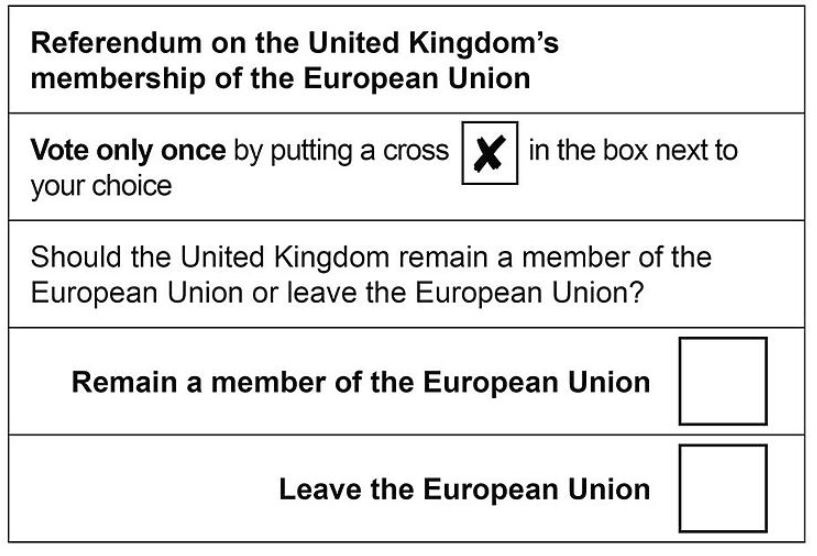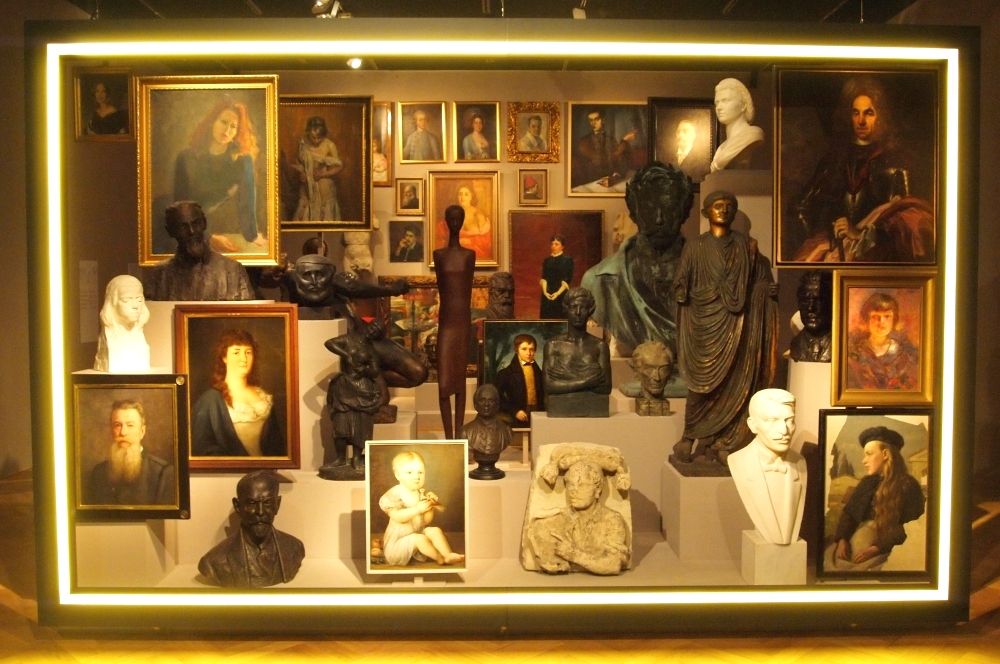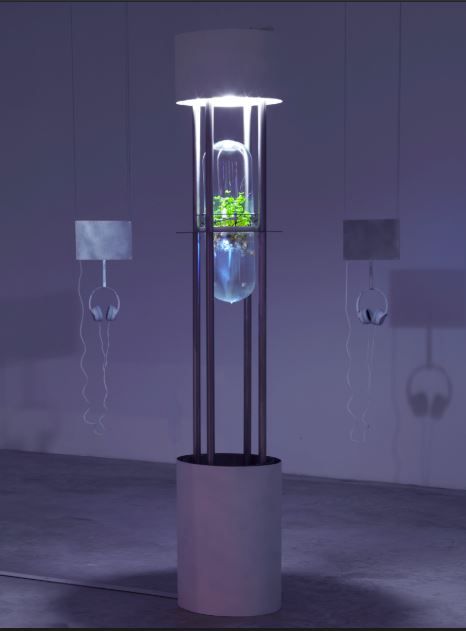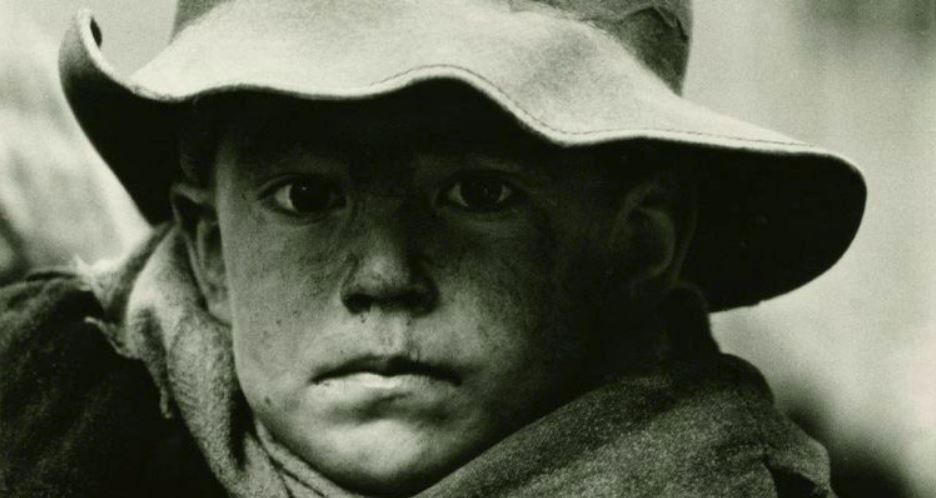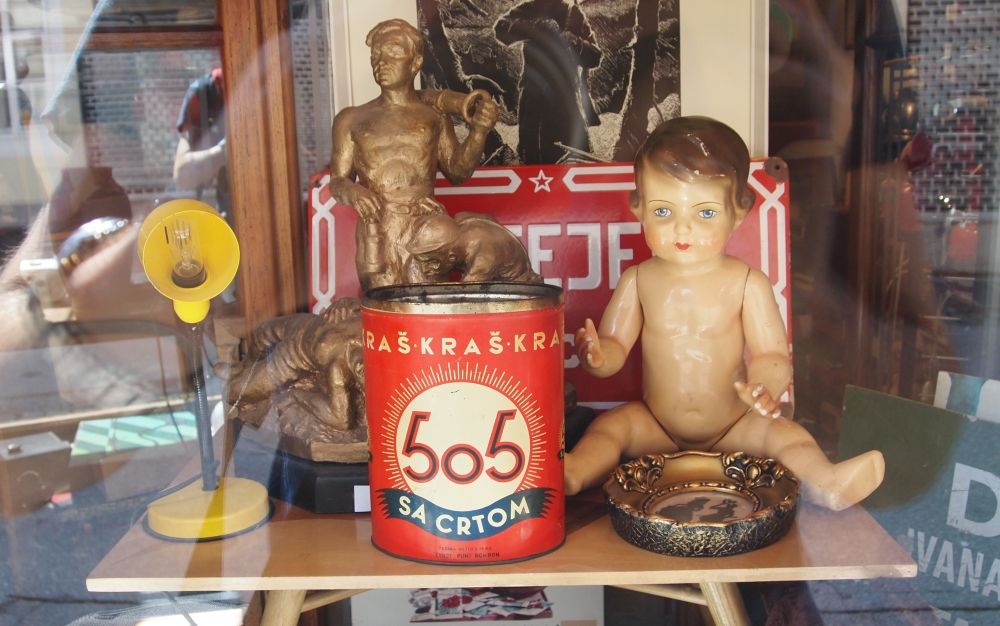News
STA, 3 December 2018 - The mayoral race in Koper was too close to call until all mail-in ballots were counted on Monday. The count confirmed Aleš Bržan, a radio host, managed to dethrone long-serving Mayor Boris Popovič, but by a mere seven votes.
Of the 46 mail-in votes, 45 were valid, commission chair Miloš Senčur told the press.
Twenty-five votes were for Popovič and 20 for Bržan, which means that according to unofficial results, Bržan received 13,921 votes and Popovič 13,914.
In his first statement after the mail-in votes were added to the tally, Bržan said "people have decided on change and the change is here, so all I can say is thanks to all those who have made an effort and to all who turned out to vote".
He did expect a narrow result, yet not that narrow. "Nobody expected such a narrow outcome. We expected a margin of several hundred votes."
Earlier in the day, Bržan said he would demand recount since last evening's count of the votes from early voting revealed some irregularities.
It was reported that there were 2,715 ballots from the early vote, but the number of ballots exceeded by six the number of people who were registered as having voted.
But this is according to Bržan not an option now. "For us, this story is over."
In a comment to a fierce race, Bržan said "both candidates should first calm down people and passions so that we can start living normally again".
Meanwhile, Senčur explained that the number of ballots and the number of people having voted in advance in fact matched. Of the 2,715 ballots, nine were invalid.
He explained, however, that complaints about the performance of the local electoral commission could be filed until midnight.
Asked whether it was still possible for the Koper vote to be annulled, he said: "Anything is possible if the complaint is justified."
The mayoral race in Koper provided one of the biggest surprises in this year's local elections.
Not only did Popovič lose after 16 years in office while he was set to win his fifth term in a landslide even two weeks ago, but also for Bržan, who, except on the coast, was until recently relatively unknown.
Securing 30.4% of the vote in the first round, Bržan trailed Popovič by 14 points, but was then endorsed by almost all the other mayoral candidates in Slovenia's fourth largest municipality.
Popovič, who conceded defeat already last evening, has run Koper in a rather authoritarian manner, which many locals got fed up with, apparently also Bržan, who announced to bring change to the style of leadership.
Bržan, born in Koper in 1976, is a logistics engineer, but he is best known as a host on a popular local commercial radio station.
The website of his Aleš Bržan List (LAB) party says that over the past decade, he has managed a small company.
While still a student, he overhauled the Koper students' club and revived the streets of Koper with a special project.
Not entirely a political novice, Bržan challenged Popovič before, in 2014, when he, with the support of the Modern Centre Party (SMC), emerged as the runner-up.
He later distanced himself from the SMC, the party of the former prime minister, Miro Cerar, and has spent most of the past four years as independent city councillor.
He founded his LAB party just before this year's local elections, but was not among the fiercest critics of Popovič. On the contrary, he credited his predecessor with a number of achievements.
Given that his party has won nine seats on the city council to emerge as the second strongest, it seems that such restrained rhetoric worked for both the party and him.
All our stories related to Koper can be found here
Below is a review of today’s news in Slovenia, summarised by the headlines in the daily newspapers for Tuesday, December 4, 2018, as prepared by the STA:
Local elections
"The lessons of mayoral elections": Looking at the tight outcome of the mayoral run-offs in Koper and Šmarješke Toplice, Delo writes that the "post-election abstinence hangover" may last for at least four years, which is something worth remembering at least until the Euro elections. (front page, pages 4, 5, 7)
France fuel protests
"Enraged genie out of the bottle": The face of the protest France is unpleasant as democratic demands have turned into street riots. (front page, page 6)
Party financing probe
"What would the coalition probe first?": The Marjan Šarec List (LMŠ) has drawn up a proposal for a parliamentary inquiry into party financing from abroad, which data indicates would target the opposition Democratic Party (SDS). (front page, page 2)
DNEVNIK
Local elections
"Koper drama resumes with complaints": Outgoing Koper Mayor Boris Popovič has not reconciled himself to having been defeated by a mere seven votes. His lawyer has announced his camp will resort to all legal means at its disposal. (front page, page 2)
German-speaking community
"Austria pressing for minority recognition": Austria has again formally supported the German-speaking community in Slovenia in its demand to be recognised as an ethnic minority in the constitution. The demands have been stepped up since a right-wing coalition took over in Austria. (front page, page 3)
FINANCE
Interest rates
"Which bank offers highest deposit interest rates?": Slovenian households are piling up their savings with banks. Although time deposits are getting less popular, they still total EUR 4.8bn, which is a billion more than in the pre-crisis year of 2007 when interest rates were much higher. (front page, pages 2, 3)
Banks
"Who's who in Slovenian banks?": The paper offers an analysis of the Slovenian banking sector and how it has changed over the past decade. (front page, page 4)
Healthcare costs
"Higher pay eating at contributions and services in healthcare": The management board of the ZZZS public health insurance fund has drawn attention to the fact that the government has again failed to secure the funding for the pay rise agreed with the trade unions. (front page, page 6)
VEČER
Local election analysis
"Elections of change": This year's local elections saw independent candidates, tight vote outcomes, new faces, few women mayors and expectation of change. (front page, pages 2, 3, 9, 12-15)
Maribor hospital
"New obstacle in effort to tackle anaesthesiology": The Health Ministry has failed to approve a special programme funder which would help the UKC Maribor hospital tackle the shortage of anaesthesiologists by subcontracting local doctors. (front page, page 8)
Chemist murder trial
"Michel was never aggressive": The defence called its witnesses as the trial resumed of Michel Stephan for instigating to the murder of Janez Plavec from the Ljubljana Chemistry Institute. (front page, page 21)
STA, 3 December 2018 - Slovenia will take over the rotating EU presidency for the second time in the second half of 2021, having already held it in the first half of 2008. Preparations started less than two weeks ago with a several-month delay. The costs are estimated at EUR 75-80m. Finding qualified staff has been identified as the biggest challenge.
Slovenia's presidency of the Council of the EU in 2008 was praised as successful, but the stint in 2021 will be much different as the role of the country holding the presidency has changed significantly after the 2009 Lisbon Treaty, which introduced president of the European Council and the foreign policy chief.
The presidency of the Council has thus lost influence: the prime minister of the EU presiding country no longer chairs the European Council, and its foreign minister no longer represents the EU externally.
Almost all government departments will be involved
Preparations for Slovenia's presidency started with a delay of several months because of the general election and government formation, which Prime Minister Marjan Šarec confirmed in a recent interview with the STA.
The government launched the preparations on 22 November with the appointment of Igor Mally, a state secretary at the prime minister's office, as head of the project.
The project will be headed from the prime minister's office, but the preparations will involve virtually all government departments.
According to Mally, a rough staffing plan was made at the beginning of the year and the experiences of the countries holding the presidency have already been reviewed.
350 full-time jobs will be created, starting next year
In 2008, the project of EU presidency cost EUR 62.3m. Considering inflation, and the costs of other countries of a similar size that recently held the presidency such as Estonia, Slovakia and Bulgaria, the costs are estimated at EUR 75-80m, Mally said, adding that a more reliable estimate would be made at the end of February.
Most of the funds will go for the 350 full-time jobs. Officials in Brussels and Ljubljana agree that finding the right staff and providing them with proper training will be a major challenge.
Ministries will start hiring at the beginning of next year, but most of the job vacancies are expected to be filled in 2019 and 2020.
Compared to 2008, ministries now reportedly have much less staff with required skills. Ten years ago, a pool of staff experienced in European affairs was available as part of the Government European Affairs Service.
After the EU presidency, many of these people got a job at EU institutions and the service was merged into the Foreign Ministry.
Mally said that those who were actively involved in the 2008 presidency would train the new staff.
A packed schedule over the six-month EU presidency
During the six-month spell, the country will preside over around 30 ministerial sessions and more than 2,000 various working meetings and host around 15 ministerials at home.
Since most of the meetings will be held in Brussels, the Slovenian permanent representation there will need to be expanded - both in terms of staff and rooms.
Mally expects 119 officials to be sent to Brussels, which means the number of staff at the representation office will almost triple.
The office will thus have to at least temporarily move to new premises and a decision on this is expected to be made shortly, according to Mally.
Most of the meetings in Slovenia will be held at the Brdo Conference Centre, which Mally believes is the most suitable venue from the financial, logistic and security points of view.
The priorities of Slovenia's EU presidency will be determined in cooperation with Germany and Portugal to ensure continuity of the agenda. The trio also cooperated ten years ago.
An obligation and an opportunity
Among the possible topics that could be Slovenia's priorities Foreign Minister Miro Cerar recently mentioned the issue of integration of the Western Balkans, security in the face of migration, the strengthening of the welfare state, and modernisation and digitalisation.
Slovenia's Ambassador to the EU Janez Lenarčič, who was European Affairs Ministry state secretary during Slovenia's first stint at the helm of the EU, believes the presidency is both an obligation and an opportunity for the country.
Mally said each presidency wanted to leave a mark. "It's a matter of ambition. Either you want to carry out the presidency merely as a routine or you want to take advantage of the opportunity to make a difference, which is what Slovenia is aiming for."
CORRECTION: The original story, and headline, made great play on the low hours and low pay on offer with this position. However, this appears to be data entry error in both cases. While the website glassdoor.com still claims the job is for five hours a week, and €4.50 euros an hour, a rapid and very helpful response from the British Embassy has set the facts straight. In reality, and per the HM Govt site, the job is 22.5 hours a week and pays €1538.9 a month. Or, going by our original hourly count, €17.09 an hour. More details of hte vacancy can be found here, while the original article, with inaccuracies struck out, is presented below.
Brexit is set to be one of the most complex tasks the UK has faced for decades, demanding resources and attention from all areas of the economy, all levels of society. With just a few months to go before March 29, 2019, when Britain will either face a “no deal” Brexit – and thus the end of all current agreements with the EU, and made as a member of the EU – or the current plan, supported by Brussels and the UK Prime Minister Theresa, but unlikely to pass a vote in Britain’s Parliament. In short, after a few years of “phony war” things are about to get very real, very fast, and no one knows what to expect.
It’s thus not surprising that the UK Embassy in Ljubljana is seeking to hire new staff to help deal with the challenges ahead from individuals and companies anxious to learn how a deal or no deal Brexit will affect them, so that they can plan ahead, and – going into the future –handle to greater amount of queries, research and admin that will undoubtedly be necessary once the UK leaves the EU.
Find our how to get dual citizenship in Slovenia here
However, a closer look at a recent job offer raises more questions that it answers. The position of Consular Policy Officer was posted on glassdoor.com on 1 December. This calls for someone who can serve as liaison with UK nationals and local authorities in Slovenia, to keep them informed of the progress and implementation of the UK-EU Citizens’ Rights agreements. This will focus on providing accurate and timely information online and elsewhere, along with pro-active outreach to UK nationals.
So far, so good, and for UK nationals who live in Slovenia and have been worried about the lack of attention paid to British citizens in Europe throughout the Brexit debate and aftermath, and what leaving the EU could mean with regard to banking, pensions, employment, onward movement, education, family rights and so on, it’s a welcome development to know there’s going to be someone at the Embassy dedicated to understanding the issues, sharing the key points, and looking out for their interests.
It all seemed so simple back then.... the question asked on the Brexit referendum. Photo: Wikipedia
However, looking down the job listing one’s heart begins to sink. While a “deal” Brexit, with a transition, is expected to take several years to implement, the job – which is due to start 04 February 2018 – is not a permanent post, but instead being offered for 12 months.
What’s more, while the new Consular Policy Officer will be based in the Ljubljana office of the Embassy they’re only expected to work five hours week. This seems about enough time to keep up to speed with developments in London and Brussels, deal with any emails on Brexit, and perhaps engage in a little pro-active contact with the community, but far too little to actually grasp the complexity of what’s about to happen, or to provide the attention that individuals and businesses will need in the months and years ahead.
Finally, the job offer, with an application deadline closing 13 December, is five hours a week, so let’s say an easy 20 hours a month. For this the lucky applicant – who is expected to be fluent in English and intermediate Slovene, as well as previous experience or awareness of British and/or local country public sector policy development, among other qualities – will receive a monthly salary of €90, or around €4.5 an hour. This compares to the current hourly minimum wage of €4.84 (Wikipedia).
Those interested in applying for this job can see the full offer here, while those who simply came here to read about Brexit are advised to stock up on popcorn: things are about to get interesting.
All our stories on Brexit and Slovenia can be found here
STA, 2 December 2018 - Slovenian voters appear to have opted for change in the mayoral run-off on Sunday as they showed many incumbents the door to usher in newcomers that promised a sea-change in the way their communities are managed.
With elections held in 56 municipalities, perhaps the biggest surprise came in Koper, where radio host Aleš Bržan appeared to have defeated incumbent Boris Popovič.
But after Popovič already conceded, the local electoral commission revealed the gap was only twelve votes - more than 25,000 ballots were cast, so there is still a chance postal ballots, which will be counted tomorrow, may change the result.
In Maribor, businessman Saša Arsenovič convincingly defeated former mayor Franc Kangler after the incumbent, Andrej Fištravec, was drubbed in the first round.
When the final tally was made, Arsenovič carried the vote with 58%, having campaigned on his record as successful businessman and promising to turn the city's economic fortunes around.
The vote pitted the more urbane Arsenovič against the more rural Kangler, who had been ejected from office in 2012 under a cloud of corruption allegations that he has mostly deflected in court since then.
Changes in all other run-off races
All other municipalities classified as urban holding run-offs also got new mayors tonight.
In Kranj, Matjaž Rakovec, the former chief executive of insurer Zavarovalnica Triglav, will fill the mayoral seat vacated by Boštjan Trilar. He won 68% of the vote against the independent Zoran Stevanović.
In Nova Gorica in the west, the 43-year-old Klemen Miklavčič defeated two-term Mayor Matej Arčon with 51.6% of the vote, despite Arčon having a 12-point lead in the first round.
Tilen Klugler, an independent endorsed by centre-left parties, emerged victorious in Slovenj Gradec in the north-east, edging the incumbent Andrej Čas with 52% to 48%.
And in eastern municipality of Ptuj, Social Democrat (SD) Nuška Gajšek has become the sole woman mayor in one of Slovenia's 11 urban municipalities as she surprisingly defeated the former mayor Štefan Čelan with nearly 67% of the vote.
Several larger cities that are not classified as urban municipalities got new mayors as well.
Prime Minister Marjan Šarec's party lost primacy in its home base in Kamnik as his chosen successor at the mayoral office, Igor Žavbi, was defeated by the candidate of the conservative New Slovenia (NSi) Matej Slapar.
In Jesenice in the northwest, Blaž Račič, 44, a correspondent for the daily Delo, ended the 12-year reign of Tomaž Tom Mencinger with a convincing 64.6% of the vote, having already narrowly won the first round.
And in Črnomelj in south Slovenia, a staunch anti-immigrant platform did not help Democrat (SDS) candidate Maja Kocjan, who was defeated by businessman Andrej Kavšek with a clear 72.9% of the vote, having already convincingly carried the first round.
All in all, only 11 incumbents who entered the run-offs secured re-election, a stark contrast to the first round, when incumbents posted serial wins.
But it was not all upsets, as Tržič, where the campaign was bitterly fought, delivered a resounding win for the incumbent Boštjan Sajovic against former mayor Pavle Rupar.
In Brežice, long-serving mayor Ivan Molan stood his ground, as did Toni Dragar in Domžale.
At the cumulative national level the trend has changed little, albeit keeping with a long trend.
The People's Party (SLS) remains the strongest force with 26 mayors in 2012 municipalities, largely thanks to a strong base in small, rural communities. The Democrats (SDS) have 17 and the Social Democrats (SD) 16.
The three dominant political forces on the local level have long been losing ground to mayors who are running as independents (although some have very clear political pedigrees).
There are now 123 mayors classified as independents, up from 115 four years ago, with another eight fielded by multiple parties, the same as in 2014.
However, there has been a reversal of the trend of declining voter engagement, as turnout stood at 48.4%, almost two points below that of the first round but five points higher than in the run-off in 2014.
STA, 1 December 2018 - Foreign Minister Miro Cerar said that there were no legal grounds for recognising the German-speaking community as a minority as he responded to a renewed call by the community to be granted the same rights as the Italian and Hungarian communities in Slovenia.
According to a report in Saturday's issue of the newspaper Večer, Cerar told Austrian members of the Slovenia-Styria committee that there were no legal grounds to recognise the minority and "no circumstances that would dictate giving a special status to this ethnic group".
"But we will work to additionally support it in its cultural activities and ensuring its identity," Cerar said on the sidelines of the meeting of the joint committee on Friday.
The Federation of Cultural Associations of the German Speaking Ethnic Group in Slovenia in Slovenia repeated its call to be recognised as a minority in the Constitution this week.
There are around 2,000 “German-speaking Slovenes” in Kočevje and Maribor
It demands that Slovenia and its public institutions finance the operations and sustainable development of cultural associations of the German speaking community in Slovenia, respect the community's members as loyal Slovenian citizens and introduce German as a teaching language in line with the European Charter for Regional or Minority Languages of the Council of Europe.
It is estimated that the community has about 2,000 members, most of them living in the area of Kočevje in the south and in the city of Maribor in the north-east.
Slovenia believes that the status of the German-speaking community in Slovenia falls under a 2001 agreement with Austria on cooperation in culture, education and science.
Under the agreement, the German-speaking community enjoys the rights stated in Article 61 of the Constitution, which stipulates that everyone has the right to "freely express affiliation with their nation or national community, to foster and give expression to their culture, and to use their language and script".
STA, 2 December 2018 - Norway and France got off to a good start in the Biathlon World Cup, their mixed relay teams taking the top spots in Pokljuka on Sunday.
Thekla Brun-Lie and Lars Helge Birkeland took the honours in the 2x6-kilometre event, finishing the course in 38 minutes and 26.7 seconds, 8.5 seconds ahead of Austria.
Ukraine finished third, 20.7 seconds behind Norway, despite needing only one reload
The Slovenian pairing of Jakov Fak and Urša Poje were 11th.
In the double relay - two runs of 6km and two of 7.5km - France proved unbeatable, mostly due to Martin Fourcade's flawless third leg.
The Swiss four was surprisingly second 38.7 seconds behind, while Italy took third place.
Slovenia did not compete in the second event.
The World Cup continues at Pokljuka on Wednesday with a men's 20-kilometre race.
Below is a review of today’s news in Slovenia, summarised by the headlines in the daily newspapers for Monday, December 3, 2018, as prepared by the STA:
DELO
Local elections
"Who will get Koper?": It is still not clear who has won the mayoral run-off in Koper between incumbent Mayor Boris Popovič and radio host Aleš Bržan, the hottest race of this year's local elections. (front page, 2-4)
Merry Day of Culture
"Culture opens doors and windows": Slovenians are invited today to visit museums, galleries, theatres and concerts free of charge as Slovenia celebrates the birthday of its greatest poet France Prešeren (1800-1849). (front page, 22)
DNEVNIK
Local elections
"Everything clear around Slovenia, uncertainty in Koper": The municipalities of Maribor, Kranj and Kamnik will get new mayors after Sunday's mayoral run-offs. The votes sent by mail for the mayor of Koper, which will be counted today, will meanwhile decide the tight race between incumbent Mayor Boris Popovič and radio host Aleš Bržan. (front page, 2-5)
FINANCE
Jobs
"Who will get a job easiest in 2019?": In a survey conducted by the Employment Service, employers in Slovenia have announced 35,500 new jobs in the first half of 2019, which is 14% more than in the second half of this year. (front page, 14-15)
NLB bank
"Profit in nine months lower than last year. Will NLB Vita need to be sold?": The NLB bank posted EUR 158.3m in net profit in the first nine months of the year, with insurer NLB Vita, in which the bank holds a 50% stake, adding EUR 5.8m in net profit. (front page, 4-5)
Economy
"State spends, people do not!": Slovenia's GDP in the third quarter of the year was up 5% compared to the same period last year, but for the first time since Slovenia exited the economic crisis, household expenditure did not increase. (front page, 2-3)
VEČER
Local elections
"He is promising a different Maribor": Maribor has a new mayor, as businessman Saša Arsenovič defeated former Mayor Franc Kangler in Sunday's run-off with 58% of the vote. (front page, 2-3)
Local elections
"New ones at the top": Ptuj and Slovenj Gradec have new mayors in Nuška Grašek and Tilen Klugler, with the former being the only woman at the helm of an urban municipality. She defeated the former Mayor Štefan Čelan in Sunday's run-off in Ptuj. (front page, 4-5)
The lights are on but, even last night, a Saturday, the streets weren’t all that crowded for the season, and you could walk around and enjoy the scene without being overwhelmed. In the days and weeks ahead this will change, though, as the tourist season ramps up again and folk from around the world come to Ljubljana and see what’s new this year. If you’re looking for Christmas action in the capital then it’s easy to find, just follow the lights and music. And if the temperature drops and you need a hat, scarf and gloves, or some candy, dried meat, or gifts, then take a look at the stalls along the river and behind the cathedral, where there’s a stage set up for oompah music.
Miklavž, aka St Nicholas, will also be making his annual appearance in town on Wednesday, starting at 17:00 in Krakov trg – by the Puppet Theatre and Castle funicular – then heading towards Prešeren Square, with his devils hanind out candies amid music, noise and light, as see a few years ago below. (And you can learn more about the tradition, and where else you can see it in Slovenia, here.)
With regard to festivals, fans of animation, for both children and adults, should scroll down to learn more about the Animateka festival, while a month-long festival that starts this week is the Decembrrr Festival at the former Tobačna factory complex, with 36 free music, entertainment, culinary and social events by Slovenian and international artists. The Facebook for that is here, but otherwise there’s not much online about it.
As ever, clicking on the venue names in the list below should get you more details with regard to the time, price and location, as well as other events on this week in the same place. Finally, if there's something you want to promote in a future edition of What's on in Ljubljana please get in touch with me at flanner(at)total-slovenia-news.com
Getting around Ljubljana
If you want to get a Ljubljana Tourist Card, which gives you travel on the city buses and entry to a lot of attractions, then you can read more about that here, and if you want to use the bike share system, as useful for visitors as it is for residents, then you can learn more by clicking this. Visitors with reduced mobility will be pleased to find that downtown Ljubljana is generally rated as good with regard to accessibility, and that there’s a free, city-sponsored app called Ljubljana by Wheelchair highlighting cafés, attractions and so on with ramps, disabled bathrooms and Eurokey facilities, which you can read about and download here. If you’re driving into town and don’t know where to part, our guide to how to park in Ljubljana is here.
Want / need cigarettes but the stores have closed? Here's an incomplete list of bars downtown that will satisfy your craving for the demon weed. While if you’re having trouble with the ATMs then here’s a guide to the Slovene you’ll see on screen. If you get a hangover then find out where to get paracetamol (and prescription drugs) in Ljubljana here, while details on emergency birth control can be found here.
Ljubljana is a small and relatively safe city, but if need to contact the police then there’s a special number for foreigners, and that’s 113.
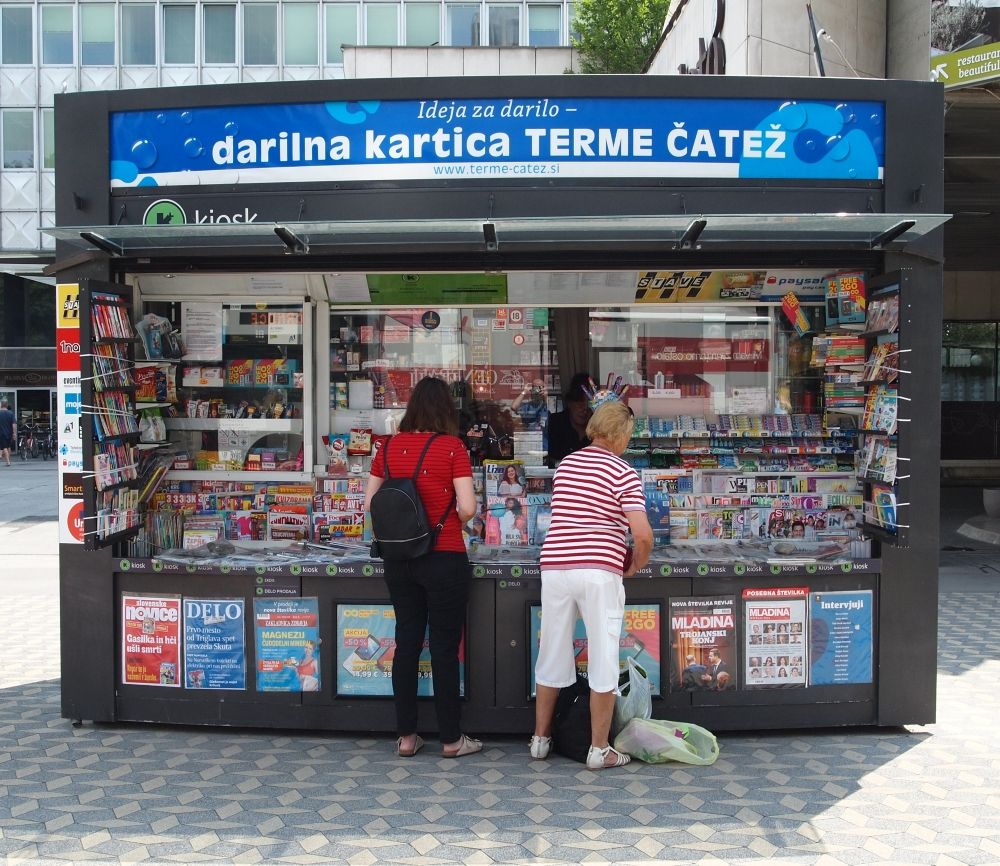
Photo: JL Flanner
Want someone to hold your hand while you're reading Slovene? Check out our weekly Slovene-English dual texts.
Cinemas and films playing in Ljubljana this week
You can read about all the cinemas in town here, while a selection of what’s playing this week is below, and note that kid’s movies tend to be shown in dubbed versions, so do check before driving out to a multiplex and dropping off the young ones if they can't understand Slovene. That said, parents should pay attention to Kinobalon, which is Kinodvor's regular weekend series of film screenings and events for children, from babies on up, witrh special parent/child events, "first time in a cinema" screenings, and babysitting. Learn more about it here, and see the current schedule here. (And if you like watching trailers with subtitles as a way of learning Slovene, then catch up on some from earlier this year here).
Animateka, the International Animated Film Festival, is back for it’s 15th edition, running from Monday to Sunday. This is mostly happening at Kinodvor and Kinoteka, and will include features and shorts from around the world, aimed at both children and adults, with a special focus on Hungary. There are also workshops for children, masterclasses and panel discussions for adults, a related exhibition of VR and 360-degree gaming. More details can be found here.
Kinodvor – The arts cinema not far from the train station, which has a nice café with books and magazines, seems to be given over to Animateka this week. For this we’ll highlight the Japanese Mirai of the Future, to be shown with English and Slovene subtitles, and Wes Anderson’s Isle of Dogs. On Thursday you can see Ce Magnifique Gâteau! and then attend a Q&A with the directors. On Saturday there’s Stereo Expanded: National Film Board of Canada, a presentation of various shorts that play around with 3D.
Kinoteka – The revival house at one end of Miklošičeva, a street that’s worth walking up for the architecture alone, is also taking part in Animateka, with some, but not all, films shown with English subtitles, so do check. One that will be supported with both English and Slovene is The Breadwinner.
Kolosej - The multiplex out at BTC City Mall is playing all the big movies, which this week include Robin Hood, The Grinch (with both subbed and dubbed versions), The House that Jack Built, Widows, Fantastic Beasts: The Crimes of Grindelwald, El mayor regalo, Little Italy, Bohemian Rhapsody, Halloween, Johnny English 3, A Star is Born, Gajin svet, The Grinch (in subbed and dubbed versions), Robin Hood and Widows. New this week are Fahrenheit 11/9, Michael Moore’s Trump movie, Hannah, and Pat in Mat znova v akciji; while starting Wednesday is Mortal Engines and on Saturday a dubbed version of Spider Man: Into the Spider-Verse.
Komuna – The cinema in a basement behind Nama department store is showing Bohemian Rhapsody, The Grinch (dubbed), and Fahrenheit 11/9.
Clubbing in Ljubljana
Compared to some European capitals it can seem that nightlife in Ljubljana ends rather early, especially along the river, but there are still bars that stay open late and clubs were you can dance until dawn, and perhaps the best place to stumble across something interesting is the legendary Metelkova. Be aware it's a grungy kind of place and not for all tastes, but also that there's consideable variety to found within the various clubs there, from death metal to electropop, gay caberet to art noise. You can read "the rules" of the place here.
Channel Zero – Monday night is Dub Lab, and this week the show’s being run by Šlagwerk. The on Friday there’s a night called Everything GOES, with a team of DJs made up of Rope, Jerry, Sunneh, Fogy, and Stojc, none of whom seem to have mix online.
Gala Hala – Breakbeat Pressure is the name of the game on Friday, with an all-nighter featuring DJs Pips, Dado, Zhe and Woo-D. A fun mix by the last name on that list is below.
Klub Cirkus – The more commercial end of clubland has what I’m sure will the first of many student Christmas parties on Wednesday, with an all-nighter offering “electronic dance music”. Friday it’s the turn of R’n’B Explosion, featuring fresh anthems and classics cuts with DJ Dey and DJ Martee. Saturday then offers something a little different, with Gramophonedzie #3 LIVE!, featuring a DJ, live singer and live trumpet.
Klub K4 – The legendary klub 4 kool kids has two all-nighters this week. On Friday there’s K4 Temnica with DJs Labud, Stojan, Nulla and Gojc, while on Saturday there’s Just A Dance, with DJs DEN7EL, Elovetric and Rinçage Énergique, and visuals from VJ 5237.
Orto Bar – Friday night there’s Shadowtime, playing alternative, dark 80's, industrial, gothic rock, and synthpop.
Harm reduction and drug testing
Drogart is an organization that aims to minimise harm on the party scene, and offers drug-testing services and reports on their webpage. It’s in Slovene, but you can Google translate it or work things out yourself, andout story on the group is here. One thing they recently warned of were pink Pharaoh pills with around twice the normal MDMA content (measured at 261 mg). See pictures and learn more here, but do remember that all the usual drugs remain illegal in Slovenia, while our in-depth profile of the group is here. We've also heard increasing reports - albeit anecdotal - of women's drinks being spiked in the city, so take care and let friends know where you're going.
Things to do with children in Ljubljana
You can find our Top 12 list of things to do with kids in Ljubljana here. If want to read more about the philosophy behind the wonderful House of Experiments look here, while our trip to the Museum of Illusions is documented here, and there’s always riverside walks, ice cream and pizza.
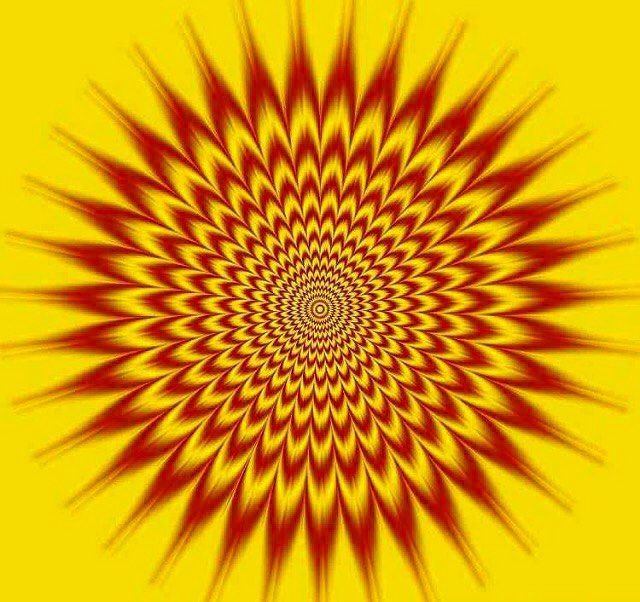
Photo: JL Flanner
December at Ljubljana Castle
The city’s main attraction, the Castle, has a lot planned for December, including an innovative projection on the walls at 17:00 each day. Learn more about what’s going on up on the hill this month here.
Live music in Ljubljana
Cankerjev dom – Tuesday evening there’s a live show from Autoryno, as part of a series curated by John Zorn.
Gala Hala - Wednesday night there’s Kočevje u Lublan, with live performances from Pankeroschi, Septic Order, Movemental and Nika&Nejc. Thursday there’s then the Croatian band Šumski. On Saturday there the second dub night of the week – the first is at Channel Zero – starts with a live show from Hornsman Coyote, and then goes on until 06:00 with the sounds being supplied by Jahmessenjah Sound and Selektor Ohoroho.
Klub Gromka – It’s a busy week at this club in Metelkova. On Tuesday there’s Kvartet Accademia, playing chamber music. Thursday there’s Noites Do Brasil, from 19:00 until after 04:00, with live and DJ music from Brazil, with the line-up including Sherzer Brigade, Denise Dantas Trio and DJ Yors Truli. Friday there’s then another mix of live and DJ music at an all-nighter called Kornet, with the live side of things being take care of by Haiku Garden, Mint, Koshava, Ujma and Lynch, while the DJs are ZORKOW, LE_EN_ART, Kaluza8, and LNLN. The week ends on Saturday with metal from Sober Assault, Veil of Deception, and Obnounce.
Kino Šiška – Friday, 20:00 on, there’s a free to enter battle of the bands for student groups, Špil liga, with voting by SMS.
Ljubljana Castle – Thursday night, starting at 21:00, there’s Nina Strnad & the Jazz Club Gajo Quartet.
Orto Bar – A packed week at Orto begins on Wednesday with death metal from Revocation, Archspire, Soreption, and Rivers of Nihil. The metal continues on Thursday with another Kadilnica of Death production, featuring doom, groove and sludge from Mist, Deep Down Bellow (sic), and Mutism. Saturday brings yet more metal, this time from Ensiferum and Trio de facto, with the headliners – and perhaps the support – putting on an acoustic show.
Pritličje – Thursday night there’s electronic music from OVAL Live! and Luka Prinčič Live!
LGBT+ Ljubljana
If you want to learn more about Ljubljana Pride, then take a look at our interview with its president here. If you're looking for more general links on "gay Slovenia", including a history of the scene and various projects, then you can find that here, while our stories about the community can be found here.
Klub Monokel – This lesbian bar in Metelkova is open every Friday night, and this Friday there’s music all night from DJs Kieran Loftus, Felis Catus, DVMIR and Lil Ris.
Klub Tiffany – The gay bar next door to Monokel is also open every Friday, and every Monday until June 2019 there's tango at 18:00. Tuesday evening, 20:00 to 22:00, there’s a talk on chemsex. Thursday, 20:00 to 22:00, there’s a café night on video games and geek culture.
Pritličje – This is the closest Ljubljana comes to a "gay bar" so it's a good thing this LGBT-friendly cafe / bar / events space is such a good one, and open from morning to night.
Museums and galleries in Ljubljana
Most public galleries and museums are closed on Mondays, although not the National Museum.
Plečnik's desk. Photo: JL Flanner
Plečnik’s House is worth a visit if you want to learn more about the architect who gave Ljubljana much of its character. Read about our guided tour here. Something on for a limited time is Plečnik and the Sacred, showing here until January 20, 2019.
Cankerjev dom – Running until the end of February 2019 is an exhibition titled Ivan Cankar and Europe: Between Shakespeare and Kafka. This is “An examination of Cankar’s art through an analysis of influences and interpretations, and juxtaposition with contemporary European writers. The visually elaborate architectural and graphic layout, supported by audio-visual media, installation art and diverse visual highlights, offers a vivid account of Cankar’s excellence, his comprehensively exquisite aesthetic and artistic vision.”
City Art Gallery – Drago Tršar recently had a show at the main Moderna looking at his monumental works, and now this smaller gallery in the Old Town, not far from Town Hall, is showing some the sculpture’s erotic works, on until January 20, 2019. It’s being promoted with the following example.
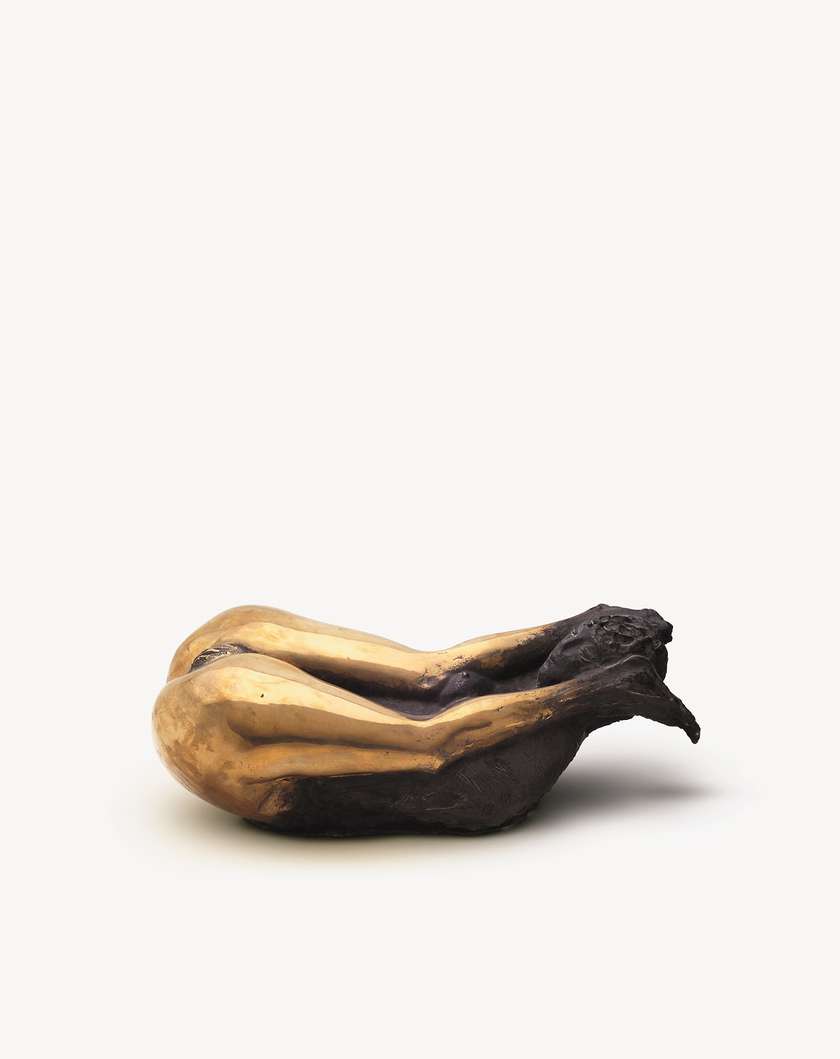
City Museum – The Museum in French Revolution Square has an exhibition on the writer Ivan Cankar that’s on until the end of February 2019, with pictures, books and manuscripts, all presented in Slovene and English. It also has a very interesting permanent exhibition on the history of Ljubljana, from prehistoric times to the present day, with many artefacts, models and so on that bring the story alive.You can read about my visit here. Until March 2019 there's a show highlighting the work Elza Kastl Obereigner (1884-1973), a pioneer Slovenian sculptress, with an example of her work shown below.
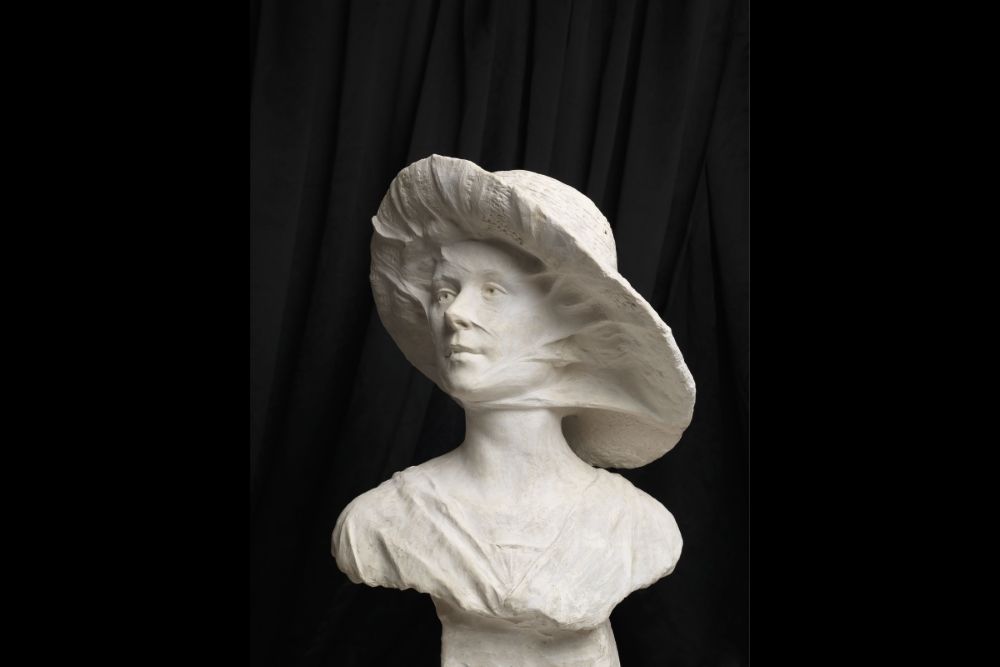
Photo: M Paternoster
The Faces of Ljubljana in the City Museum. Photo: JL Flanner
Galerija Vžigalica – Saša Spačal has a show here until January 6, 2019 called Earthlink, “working at the intersection of intermedia art, exploration of living systems and audio frequencies, links Earth to the post-human present, that includes both a seed of the future as well as a shadow of the past.” A promotional image is what's shown below.
Simbiom – ekonomija simbioze, 2016 © Dejan HabichtArhiv Moderne galerije
Galerija Kresija – Showing in the City Hall’s right atrium until December 13 is an installation, Gorazd Krnc: Tod in Ondod (Worth Not Knowing Where Knowington Is), which includes video projections
International Centre of Graphic Arts – Running from Friday until March 3 2019 there will be a show of posters from Milton Glaser, with the poster for the show shown below.
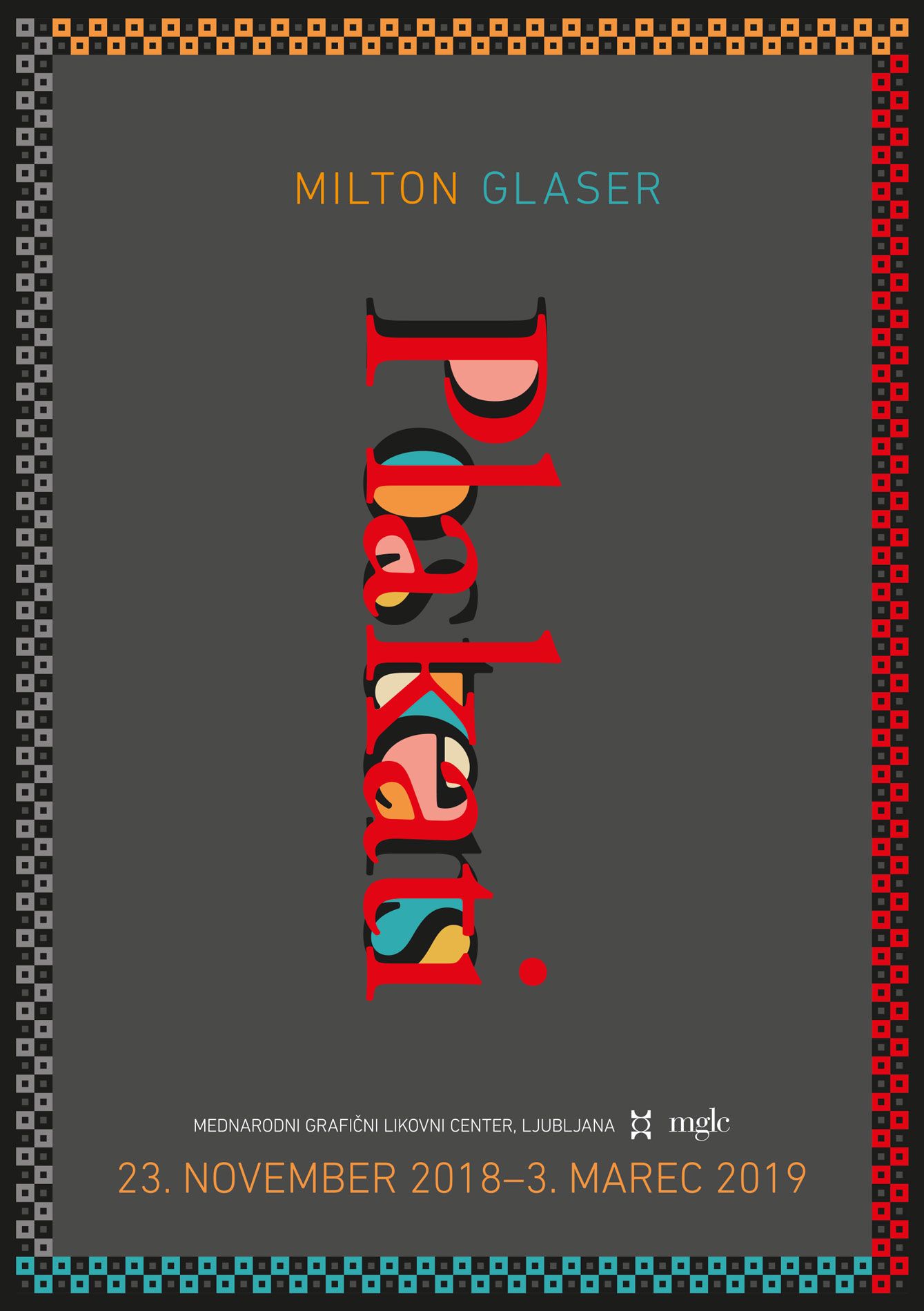
Ljubljana Exhibition & Convention Centre – Just outside the centre of town, at Dunajska cesta 18, you can see a lot of plasticized bodies at the Body Worlds Vital show, running from October 20 until January 20 2019.
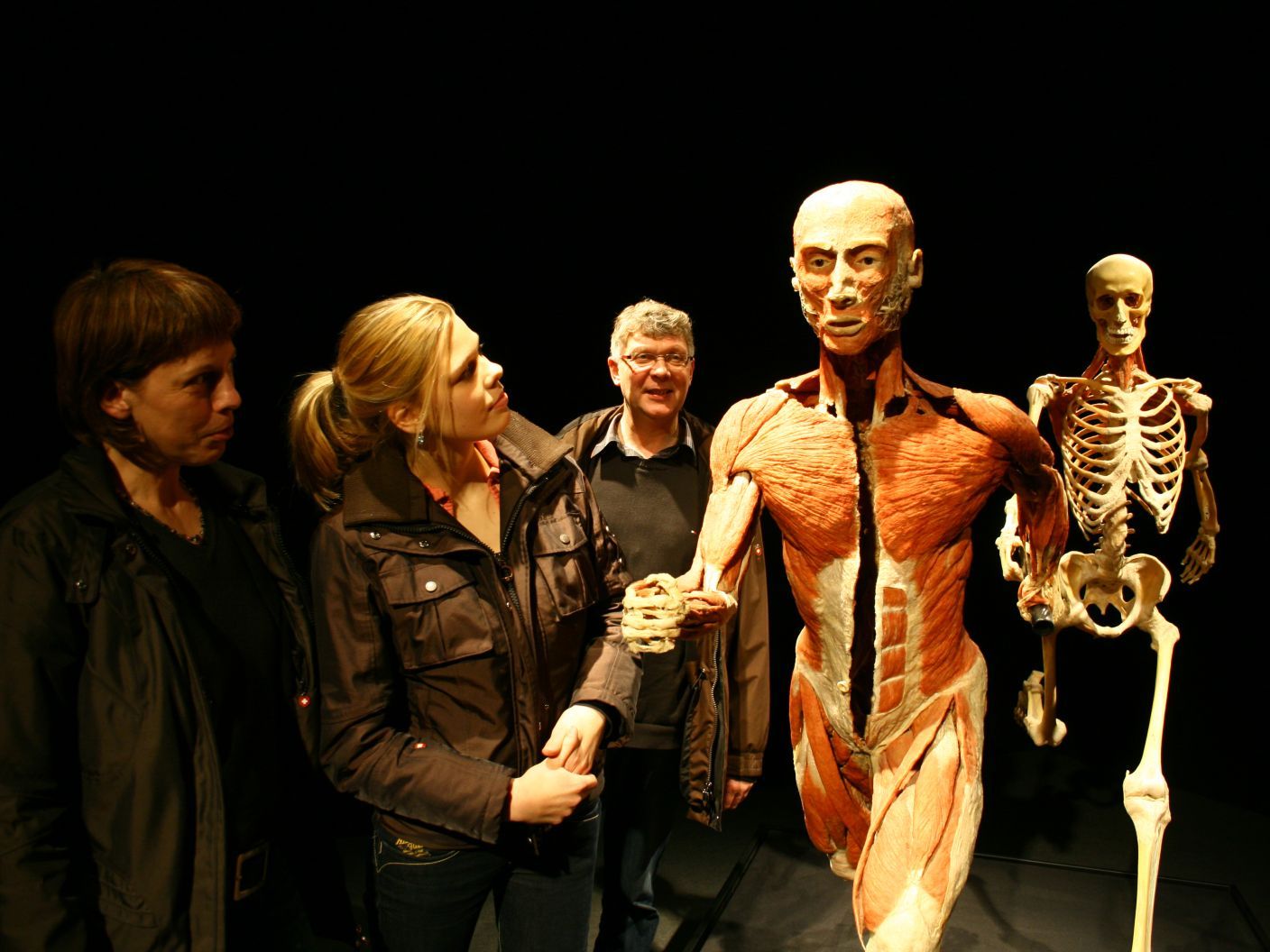
Photo: Body Works Vital
MAO – The Museum of Architecture and Design is showcasing Slovenian designers in a show called Made in Slovenia, lasting until the end of 2018: “The selling exhibition aims to present good practices of Slovenian designers and companies in the creative sector.”
Sam, 1966, fotografija na srebroželatinskem papirju. ©Stojan Kerbler
Moderna galerija – The main branch of this gallery, to be found near the entrance to Tivoli Park, has a good collection of modern art, as well a nice café in the basement, and it's latest exhibition focuses on the photographer Stojan Kerbler, which runs until January 13, 2019, and shows rural live in Slovenia for the recent past.
Museum of Contemporary History – The museum in Tivoli Park has two new shows. One is called Museum's (R)evolution 1948-2018, marking the place's 70th anniversary with an exhibition tracing its evolution through artefacts, photographs and personal stories and running until January 6 2019 (details here). There's also In Search of Freedom: 1968-2018, looking at the 1968 student protests.
National Gallery – The country’s main gallery has “the best” of what’s on offer from the Middle Ages to non-contemporary modern visual arts, and is in a great location for exploring other areas, just by Tivoli Park and opposite the main branch of the Moderna galerija. Running until February 10 2019 is a show called Ivana Kobilca (1861-1926): But Of Course, Painting Is Something Beautiful!, featuring works like the one below. You can read about our visit to the room containing scared art from the Middle Ages here, and see a picture from our trip after the two girls.
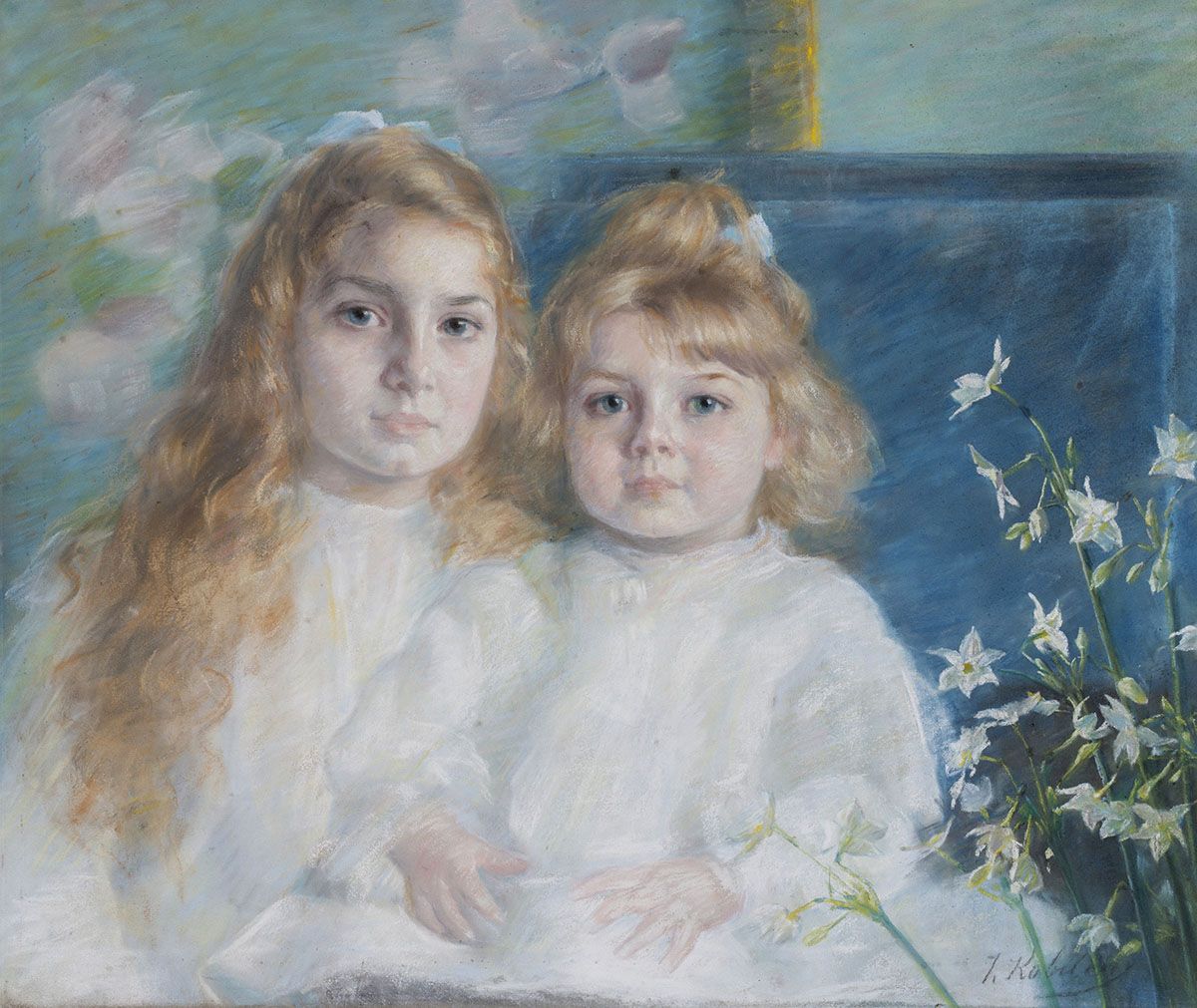
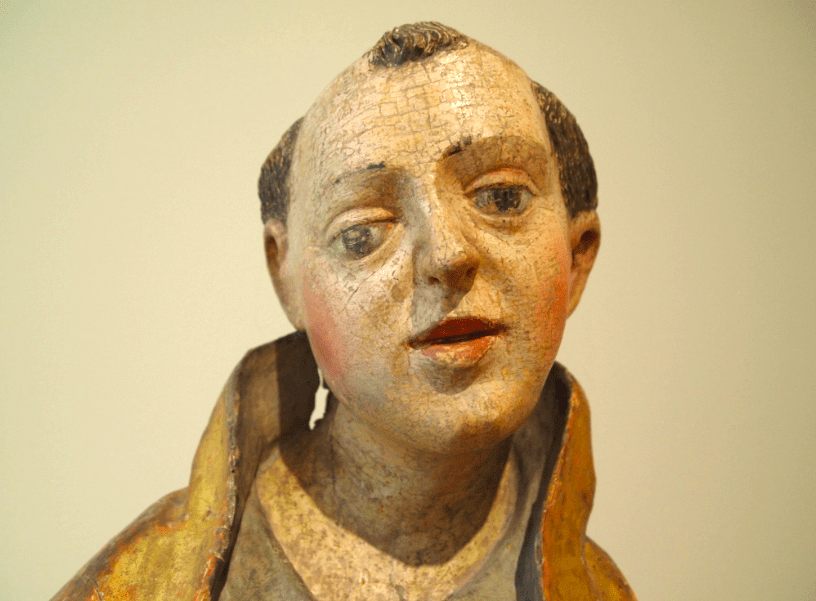
JL Flanner
National Museum of Slovenia – There’s plenty to see in the permanent collection here, from Roman times, Egypt and more, with the big draw this season being the exhibition of over 140 items of gold from Ming Dyntasy China, as reported here, and with an example below. This runs until February 15th.
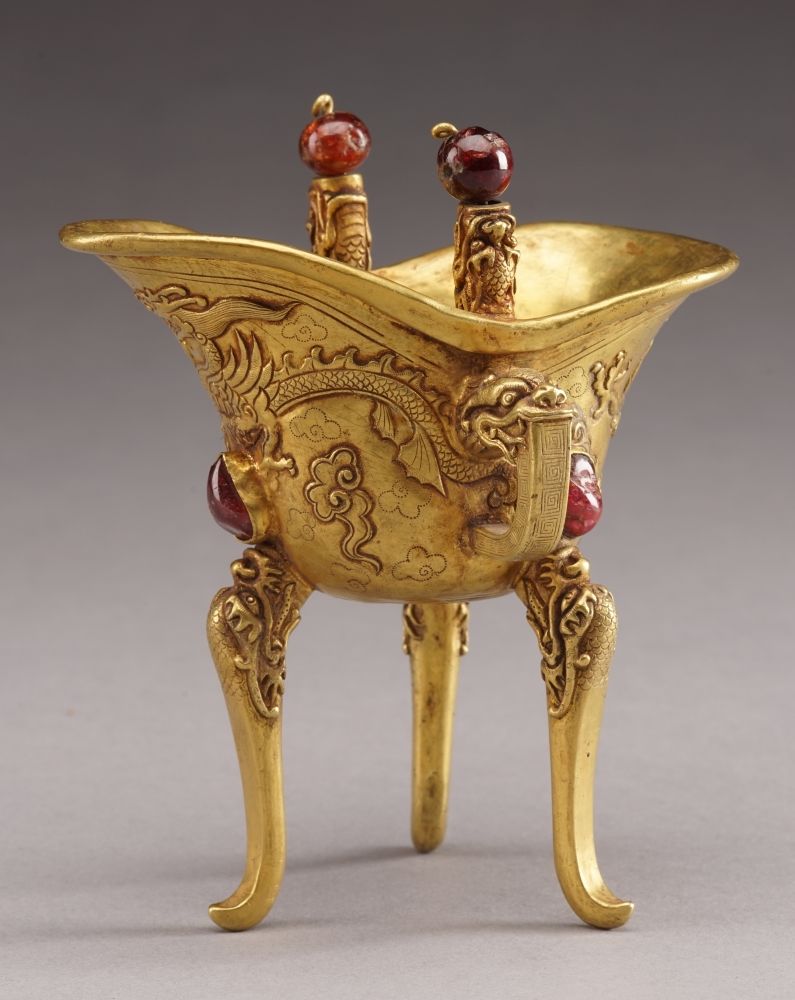
Photo: Wang Wei Chang
Meanwhile, the museum's Metelkova branch, located between one branch of the Moderna galerija and the Ethnographic Museum has some rooms on Church art, furniture and weapons, with the latter including more guns than you'll see anywhere else in town, and quite a thrill if coming from a nation where such objects are not household items.
Natural History Museum – On until the end of June 2019 is Our Little Big Sea, which takes a look at the oceans.
Slovene Ethnographic Museum – The museum currently has a temporary show on Bees and Beekeeping, on until June 16 2019, as well two permanent exhibitions. One of these is called Between Nature and Culture, and has a great collection of objects from Slovenia and around the world, well worth the trip up to the third floor to see it (as recounted here). This place is located near the newer branch of the Moderna galerija and Metelkova.
Union is "the Ljubljana beer", but now both it and Laško are owned by Heineken. There are many local brews on offer, though, if you want to explore IPAs, stouts, wheatbeers, sours and so on Photo: JL Flanner
Union Experience – The Ljubljana-based brewer has a museum showing the history of the company, with the ticket also including access to part of the factory and a few samples of the product. You can read about our visit here.
It's not a formal museum, but if you're interested in "Yugo-stalgia" then you'll enjoy a trip to Verba, a small, privately run space that's crammed with objects and pop culture items from the era, and is conveniently located at the start of one of the short walks to the castle. It's also a great place to take pictures, if you leave a donation, and you can read more about it here.
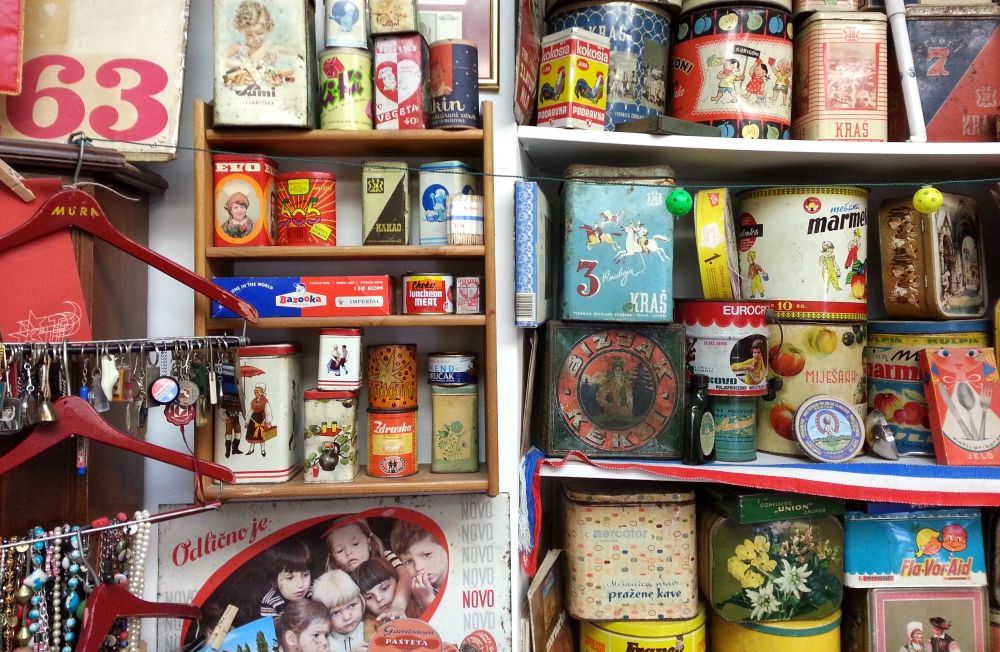
Verba. Photo: JL Flanner
Alternative Ljubljana isn't a museum or gallery, as such, but instead turns the city streets into a museum and gallery. Learn more about their tours of street art, history and LGBT Ljubljana here.
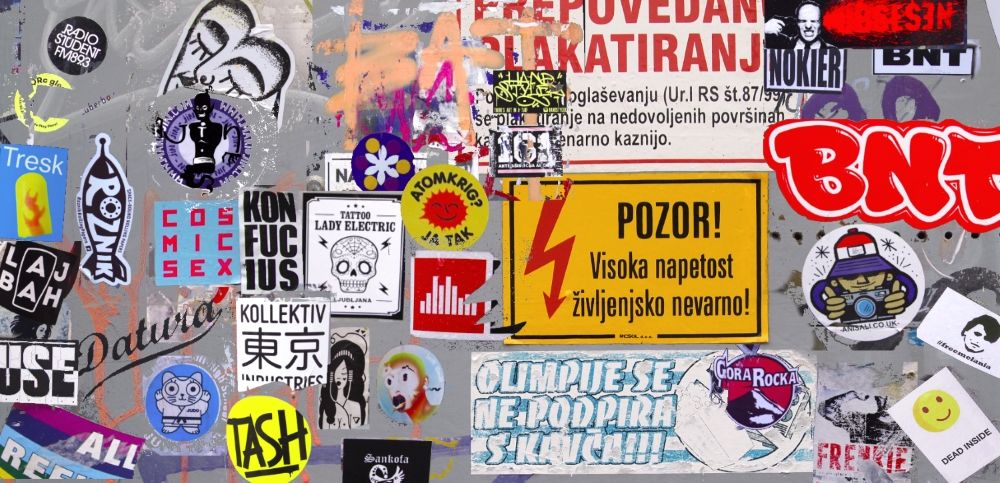
Photo: JL Flanner
Opera, theatre and dance in Ljubljana
Gledališče IGLU - IGLU Theatre – Saturday night this group is usually putting on an English improv show somewhere in town, but it’s generally promoted after this is written, so check the Facebook before putting on your shoes.
Pocket Teater Studio – Friday night there’s A Sentimental Education - Songs and Stories, which is being promoted as “a colourful storytelling tour through the Sentimental Education of a subcontinent, with Carlos Pascual on the microphone and Carlos Yoder on the piano. Storytelling in English and songs in Spanish from the Latin American tradition in order to illuminate a world that seems completely gone.” The venue is tiny, and so it’s important to make a reservation via This email address is being protected from spambots. You need JavaScript enabled to view it. in 070 325 522. The price of ticket is 20€ (15€ for students) and includes wine during the whole performance.
SNG Opera and Ballet – Swan Lake will be performed from Wednesday to Sunday, although most shows seem to be sold out. Note that it continues to be performed throughout the season, so maybe book now to avoid disappointment.
Other things to do in Ljubljana...
From November 2 to 30 there’s the Gourmet Ljubljana Festival, with a full programme of culinary events, as detailed here.
If you'd like to spend an evening painting with others, then take a look at Design with Wine, which organises painting parties on Trubarjeva cesta,
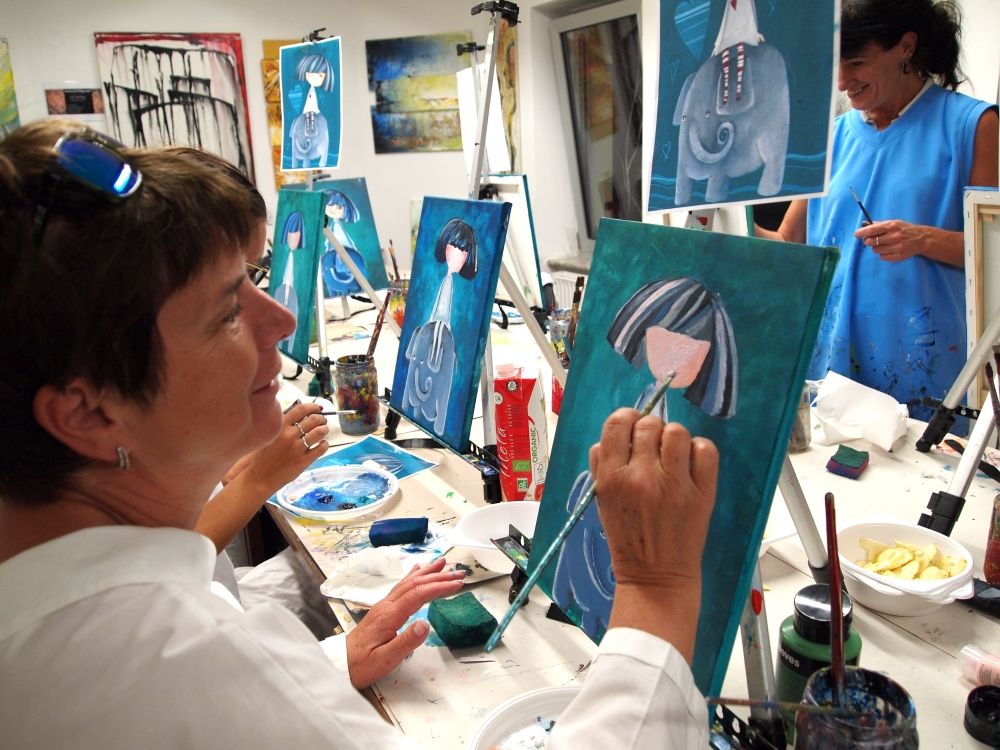
Breg Embankment, just opposite the Old Town and by the river, has a small flea market open every Sunday morning. Learn more about it here.
If you can't make it to Breg on Sunday morning, but still want to see some antiques, then check out the wonderful Antika Carniola, as discussed here. The man behind it, Jaka Prijatelj, has a fine eye for life on this street, as you can see at the top of this page, with more on his Facebook account.
Photo: JL Flanner
If you’re in town and want to go jogging or walking in nature, why not take another look at the Castle, with a brief guide to the trails here. If you want something bigger, head to Tivoli Park.
And if you're bored with the Old Town, why not take a walk, cycle or boat ride to nearby Špica and enjoy the riverside life. Learn more about that here.
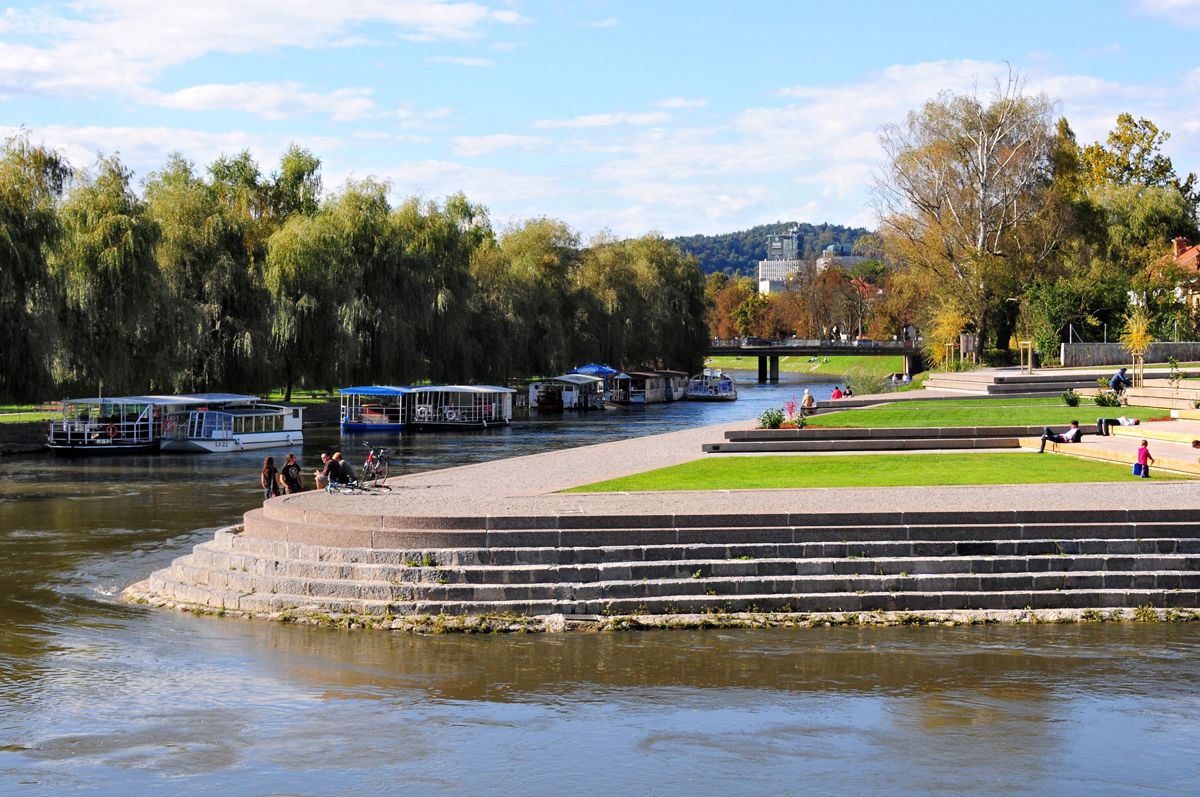
visitljubjana.si
![]()
maxpixel.net, public domain
Want to stretch and breath? Then check out our list of drop-in yoga classes for tourists, visitors and the uncommitted. If you're heading to the coast, check out our interview with a yoga teacher who offers breakfast sessions there, while if you're staying in town (or nearby) and want to try some "family yoga" then you can learn more about that here and maybe get your kids to calm down a moment or two.
There are some golf courses near Ljubljana, but even ones further away are not far, as seen in our list of all the golf courses in Slovenia. Note that these close when the snow starts.
![]()
Photo: maxpixel.net, public domain
Daytrips from Ljubljana
Most of Slovenia is only a few hours from Ljubljana, and you can easily visit Lake Bled, Lipica Stud Farm, Postojna Cave, Predjama Castle, the coast and other locations, while if you'd like to take a photo of from that bench in Bled, then you can learn how to get there here. If you’re looking for something more ambitious, then check out our recent guide to the 17 members of the Association of Historical Towns of Slovenia
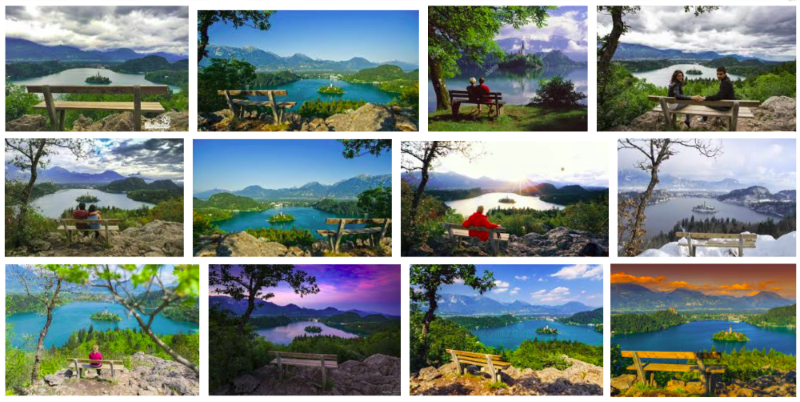
Photo: Google Image Search
Finally...
You can see all our stories tagged Ljubljana here, while if you're curious about the cost of living compared to other cities then you can learn more here.
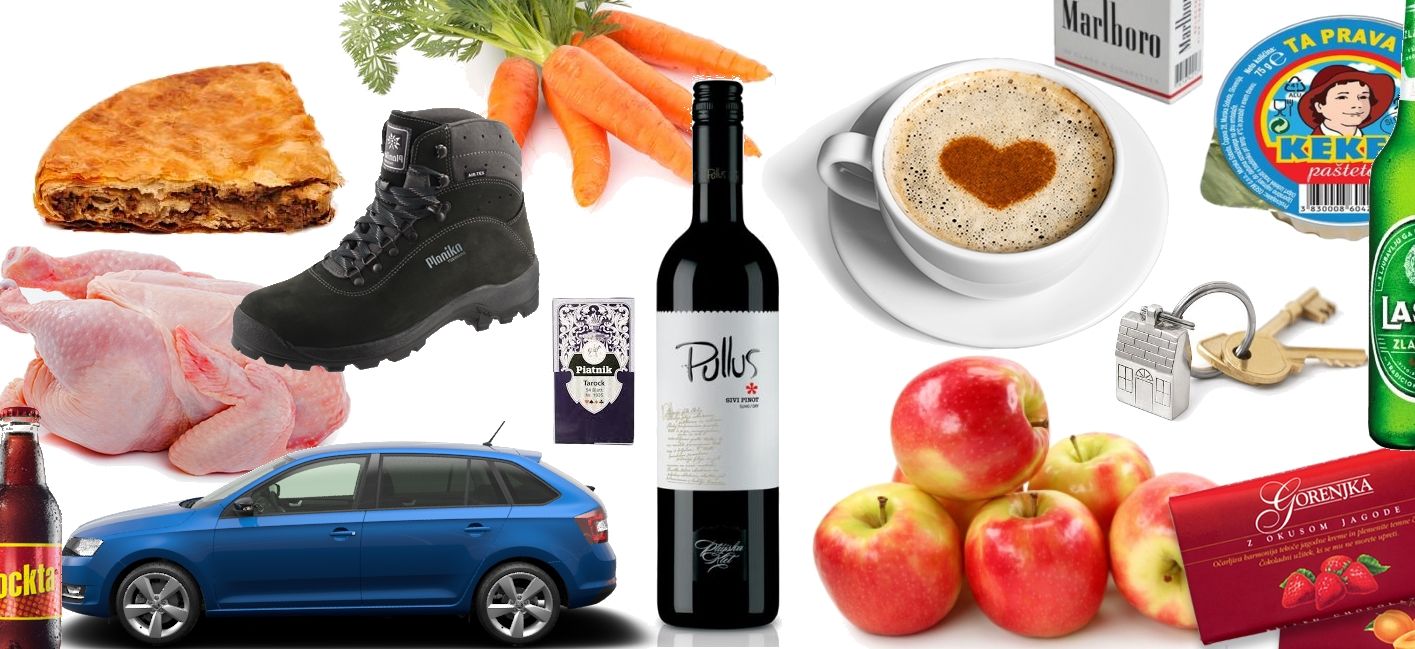
Photo montage: JL Flanner
Ljubljana has a surprising number of film festivals, and after November’s LIFFe and the LGBT+ programmes it’s time for Animateka, the International Animated Film Festival. This runs from December 3rd to the 9th and from around 11:00 to 21:00, mostly from 15:00 on, showing at Kinoteka (Cinemateque in the schedule) and Kinodvor, with other events at Museum of Contemporary Art Metelkova (MSUM+) and Elektra Ljubljana. In addition to the programme of features and shorts from around the world, this year animation from Hungary is a particular focus. Another major part of the festival is Slon [The Elephant], promising “the finest animated films for children”, with a PDF of that schedule here.
Of course, animation isn’t just for kids, and there’s also the “adult” section for those aged 14 and over (here).
There are also workshops offering, among other things, hand-drawn animation for those aged 11 to 15, green screen animation for kids aged 7 to 11, an optical toys workshop for children 11-15, and a flip-book making class (ages 8 to 12). And if you’re a little older, and perhaps work (or would like to work) in the industry, then note that there’s also a section for industry professionals with master classes, talks and panel discussions. Learn about that side of Animateka here.
And if you can’t make any of the scheduled events then there are exhibitions, including one on VR and 360 degree gaming being held at the Museum of Contemporary Art Metelkova, and another looking at the work of Špela Čadež at Kinodvor. Finally, one focus of the event is a competition, with the screenings for that here.
Related: Animator Špela Čadež Gets Retrospective in Italy (Videos)
In short, whether you’re free during the week or at the weekend, an adult or a child, if you like animation, or just would like to learn more about what the art’s been up to over the last year or so, then be aware the Animateka festival is back in town, and there’s a chance for you to enjoy it in the next few days. The official website, in English, is here.
Mladina: An alliance is needed to fight SDS-associated media
STA, 30 November 2018 – The left-leaning weekly Mladina welcomes PM Marjan Šarec's appeal against state-owned companies running adds in hate-peddling media, but says it is only a first step. What needs to follow is the fostering of an alliance that will protect these companies in case of a change in power, Grega Repovž says in the weekly's latest editorial.
"Slovenian media have a problem... The Democrats (SDS), a political party, has an increasing number of products on the Slovenian market that are pretending to be media outlets... Because this propaganda machine it costly, it gets financial help from Hungary, from Viktor Orban," Repovž says.
He argues that the people of Slovenia and its media and journalists are not the only victims of this proliferation of fear and hatred by far-right parties working in concert.
Companies also find themselves under pressure, in particularly those that are involved with the state. Their managers know, including from experience under past SDS-led governments, that SDS leader Janez Janša will eventually end up issuing them a bill if they fail to cooperate.
Šarec's call was in order, but now the government has to follow up this first step by offering assistance and an alliance to these companies.
"If he is serious about this, it is not enough to point the finger at these companies. We posit that the reason why most of the exposed companies are advertising on these media platforms is their desire to secure the peace they need to do business normally," Repovž says under the headline First Step.
Speaking of the need for an alliance, he argues "this would benefit all genuine media" and lists several centrist and left-leaning media as well the right-leaning weekly Reporter.
It would also benefit politics, companies and above all the public. "The thing is a that radical politics is abusing liberal democratic institutes and institutions and rights (including those pertaining to the media and freedom of speech) and that this entails the undermining of democracy itself - and through that also of corporate autonomy."
Demokracija: Šarec’s anti-hate speech campaign is an attack on opposition media
STA, 29 November 2018 - The right-leaning weekly Demokracija says PM Marjan Šarec's recent call to state-owned companies to reflect on whether to advertise in media outlets instigating hate amounts to "the worst attack on the freedom of speech since independence", making him No. 1 enemy of the freedom of expression.
Šarec's call not to advertise in media outlets which are critical of mass migrations was a case of abuse of power par excellence, editor-in-chief Jože Biščak says on Thursday.
Although Šarec did not specify what hate content is and did not mention any media outlet, "it was clear he meant private opposition media – Demokracija and Nova24TV".
Instead of endorsing a referendum on whether Slovenia should join the UN-sponsored deal on migration, he in fact started implementing its objective 17, which speaks about media funding and advertising standards.
He announced, in the manner of the hardest communist times, attacks on the media which promote different views from those of the government and left-wing activists.
As an elected representative of the people, Šarec has a right to influence state-owned companies, for instance if state assets are poorly managed.
"But he is absolutely not authorised to use a state-owned company to suppress the fundamental and most important human right, that of the freedom of expression."
Biščak notes there is a short way from dictating state-owned companies where to advertise to police violence against those with different views.
"What is more, his actions show that he would be one of the first to abolish elections and ban opposition, whereby risking a civil war.
"He crossed the Rubicon, which he never should have," Biščak says, quoting philosopher Ludwig Wittgenstein's thesis "What we cannot speak about, we must pass over in silence."
While not denying Šarec the right to be critical or even harsh, Biščak says his instruction that advertisers should end their business cooperation with the opposition's media is "scandalous".
"In this way, by abusing power, Šarec has become enemy No. 1 of the freedom of speech," according to the commentary headlined Ludwig Wittgenstein's Seventh Thesis.
Other posts in this series can be found here (note that sometimes we use another right-wing weekly, Reporter)


